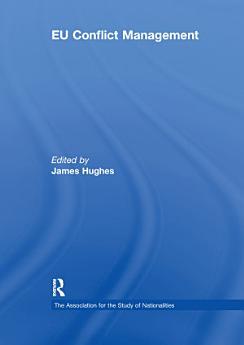EU Conflict Management
About this ebook
Case studies of EU conflict management within the Union, in its neighbourhood and further afield, explore the consistency, coherence, and politicization of EU strategy at the implementation stage. The essays examine the extent to which the EU can exert influence on conflict dynamics and outcomes. Such influence depends on a number of changing factors: how the EU conceptualizes conflict and policy solutions; the balance of interests within the EU on the issue (divided or concerted) and the degree of politicization in the EU's role; the scope for an external EU role; and the value attached by the conflict parties to EU engagement – a value that is almost wholly bound to their interest in a membership perspective (or other strong relationship to the EU) rather than to ‘shared values’ as an end in themselves.
This book was based on a special issue of Ethnopolitics.
About the author
James Hughes is Professor of comparative politics at the London School of Economics. He is also editor of Development and Transition, the newsletter of the United Nations Development Programme.







